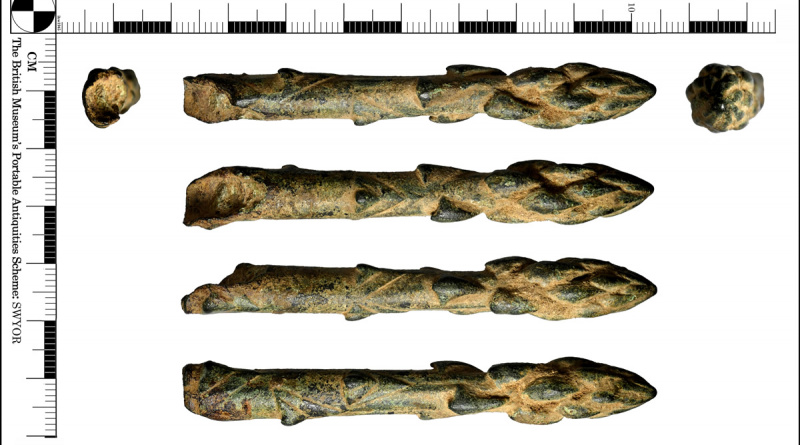Roman asparagus knife handle
A Roman copper alloy knife handle in the form of an asparagus spear. It is believed to be the first example of this type found in Britain and the PAS consider it to be a Find of Note.
Other examples
There are 16 other known asparagus knife handles from Europe, with a findspot cluster around Trier and the surrounding region. Dr John Pearce, of King’s College, London writes in the PAS record “Trier and its environs are abundant in richly decorated knife handles in complex forms of which this is an especially striking example, since the tiny delicate fronds of the growing spear are often modelled with great care.“
It is believed that this remarkable detail is achieved by making moulds directly from the asparagus spears.
Asparagus cultivation in Britain

Photo: Cambridge Archaeological Unit.
Therefore, if it were made in Britain then the asparagus would need to be grown here. In 2014, Cambridge University Archaeological Unit excavated a site near Cambridge which is believed to be Britain’s oldest Roman irrigation system.
It provided water to a set of planting beds, which were thought to be for either grapevines or asparagus.
Romans and asparagus
An internet search reveals various stories about the Romans and asparagus, some of which, like asparagus, should be taken with a pinch of salt.
Quicker than you can cook asparagus
In De vita Caesarum (commonly known as The Twelve Caesars), written in AD 121, Suetonius notes that Augustus had a number of unusual phrases that he liked to use. One of these was “celerius quam asparagi cocuntur” meaning “Quicker than you can cook asparagus” to express that hasty action was required.
With a Roman primary source, this could be real.
Asparagus Fleet
One story that is repeated all over the internet is that the Romans preserved asparagus by freezing it in the snow in the Alps and then bringing it swiftly back to Rome. This is said to be achieved by the use of chariots and “special boats, known as the ‘Asparagus Fleet’ “.
This idea seems to have its roots in a local newspaper article from Salt Lake City. There is no primary evidence available and the whole notion of freezing asparagus and transporting it back to Rome in boats has been debunked.1 It serves as a warning that some stories gain a factual status merely by being repeated rather than having any foundation.

